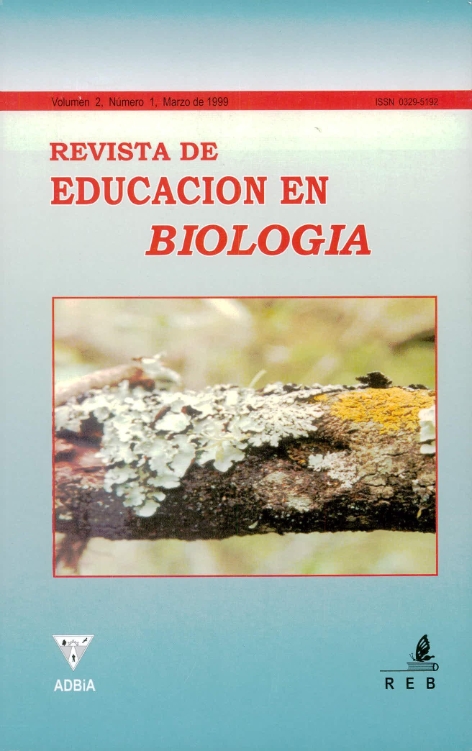Algunos fundamentos de decisiones educativas e investigativas en didáctica de las ciencias: un aporte a la reflexión de los docentes de biología
Contenido principal del artículo
Resumen
Resumen
En este artículo se tratan los tres paradigmas vigentes en las Ciencias Sociales, que sirven de base a las investigaciones educativas: el positivista, el simbólico-interpretativo y el crítico. Se analizan los fundamentos
de cada uno de ellos: los aportes teóricos recibidos; los propósitos; las metodologías, las técnicas y los instrumentos; las normas y regias de investigación; los supuestos acerca del conocimiento; y las consideraciones respecto de las relaciones entre el conocimiento científico y la práctica social. Estos elementos que, en
el área de la Educación, se traducen en interacciones entre la teoría y la práctica educativa y entre elinvestigador (científico) y el práctico (docente) e inciden en las investigaciones. El propósito del articulo es
brindar algunos elementos de análisis que permitan a los investigadores en Didáctica de las Ciencias ante la
existencia simultánea de los tres "paradigmas", reflexionar sobre distintas alternativas de trabajo y adoptar
posturas concientes y fundamentadas de su accionar. Se enfatiza que para lograrlo los futuros investigadores, necesitan además de una formación sólida, una práctica investigativa permanente.
Detalles del artículo
Sección

Esta obra está bajo una licencia internacional Creative Commons Atribución-NoComercial-CompartirIgual 4.0.
Aquellos autores/as que tengan publicaciones con esta revista, aceptan los términos siguientes:- Los autores/as conservarán sus derechos de autor y garantizarán a la revista el derecho de primera publicación de su obra, el cuál estará simultáneamente sujeto a la Licencia de reconocimiento de Creative Commons que no se permite un uso comercial de la obra original ni de las posibles obras derivadas, la distribución de las cuales se debe hacer con una licencia igual a la que regula la obra original.
- Los autores/as podrán adoptar otros acuerdos de licencia no exclusiva de distribución de la versión de la obra publicada (p. ej.: depositarla en un archivo telemático institucional o publicarla en un volumen monográfico) siempre que se indique la publicación inicial en esta revista.
- Se recomienda a los autores/as difundir su obra a través de Internet (p. ej.: en archivos telemáticos institucionales o en su página web) después del proceso de publicación, lo cual puede producir intercambios interesantes y aumentar las citas de la obra publicada. (Véase El efecto del acceso abierto).
Cómo citar
Referencias
Aranega, C. P. de, 1993. El problema de la comunicación conocimiento-acción en las metáforas o modelos de
profesionalidad docente. Primera Parte. Enseñanza de la Física. 6(2). pp. 29-36.
Aranega. C. P. de, 1994. El problema de la comunicación conocimiento-acción en las metáforas o modelos de
profesionalidad docente. Segunda Parte. Enseñanza de la Física. 7(l),pp. 11-19.
Becher, R. A. 1980. Research into practice. En W. B. Dockrel 1 Rethinking educational research. Hodder and
Stougton. London; pp. 1-64
Bredo, E. y Feinberg, W. 1982. Knowledge and values in Social and Educational Research. Temple Univ.
Press. Philadelphia.
Carr, W. 1989. ¿Puede ser científica la investigación educativa? Investigación en la Escuela. 7,
Carr, W. y Kemmis, S. 1983. Trad. Casi 1988. La teoría crítica de la enseñanza. La investigación acción en
la formación del profesorado. Ed. Martínez Roca. Barcelona.
Cazden, C. 1986. Trad. Cast. 1989. El discurso del aula. En M. L. Wittrock. La investigación de la enseñanza. Vol. III. Profesores y alumnos. Paidós. Madrid.
Elhot, J. 1990. La investigación-acción en Educación. Morata. Madrid.
Faraday. A. y Plumer, K. 1979. Doing life stories. Sociological Revíew. 27 (4).
Gimeno Sacristán, J. 1983. Planificación de la investigación educativa. En J. Gimeno Sacristán y A. Pérez
Gómez. La enseñanza. Su teoría y su practica. Akal, Madrid.
Glaser, B. O. y Strauss, A. L. 1967. Tite discovery of grounded theory: sirategies for qualitative research.
Aldine Pub.
Jackson, P. G. 1968. Trad. Cast, 1991. La vida en las aulas. Morata. Madrid.
Klafki, W. 1986. Los fundamentos de una didáctica constructivista. Educación. 280.
Kuhn, T. S. 1962. Trad. Cast. 1986. La estructura de las revoluciones científicas. Fondo de Cultura Económica. Madrid.
Laudan, L. 1977. Progress and lis problems. University of California Press. Berkeley. California.
Miguel Díaz, M. 1988. Paradigmas de la investigación educativa española. En 1. Dendaluce Segurola (Coord.)
Aspectos metodológicos de la investigación educativa. Narcea. Madrid.
Morgari, O. (Eds.) 1983. Beyond meihod sirategies for social research. Sage. Beverly Hill s.
Peme-Aranega, C. 1997. "El carácter epistemológico interdisciplinar de la Didáctica de las Ciencias. Origen,
evolución y tendencias actuales". Educación en Ciencias. pp. 3-13.
Pérez Gómez, A. 1983. Paradigmas contemporáneos de investigación didáctica. En J. Gimeno Sacristán y A.
Pérez Gómez. (Eds.). La enseñanza: Su teoría y su práctica. Akal. Madrid.
Popkewitz, Th. 1984. Trad. Casi 1988. Paradigma e ideología en investigación educativa. Ed. Mondadori.
Madrid.
Shulman, L. S. 1986. Trad. Cast. 1989. Paradigmas y programas de investigación en el estudio de la enseñanza: una perspectiva contemporánea. En M. C. Wittrock. La investigación de la enseñanza. Vol 1. Enfoques, teorías y métodos. Paidós. Madrid.
Tikunoff, W. Y. 1979. Context variables of a teachingleaniing event. En D. Beunet y D. MacNamara. Focas
on teaching .Readings in tite observation and conceptualization of teaching. Longman. New York.
Titone, R. 1986. El lenguaje en la interacción Didáctica. Narcea. Madrid.

